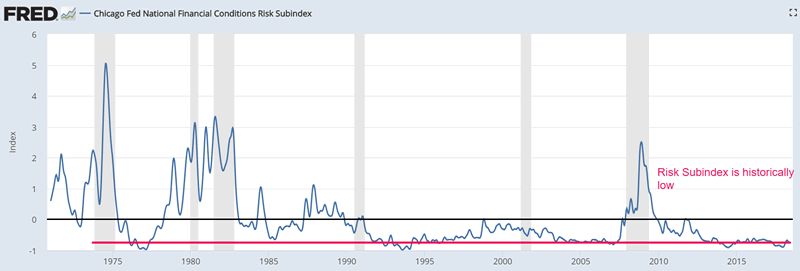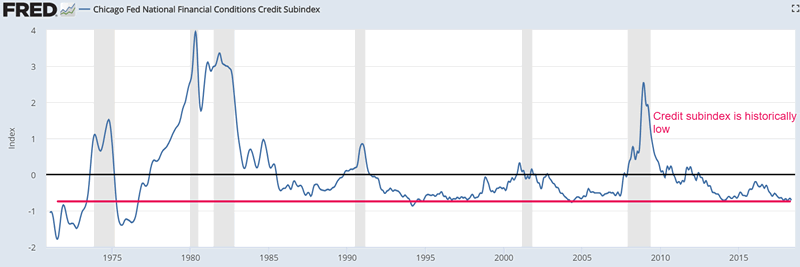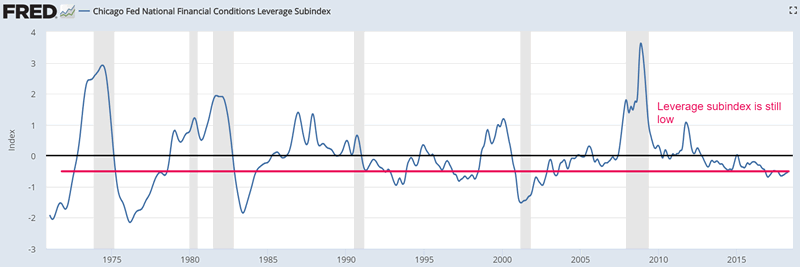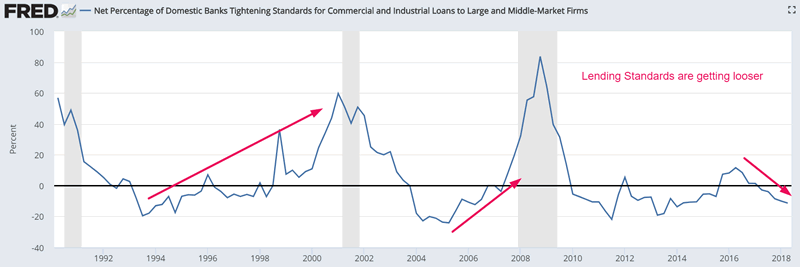Financial Conditions are Still too Easy for the Stocks Bull Market to End
Stock-Markets / Stock Markets 2018 May 21, 2018 - 05:16 AM GMTBy: Troy_Bombardia
 Investors and traders love to fixate on the absolute level of interest rates.
Investors and traders love to fixate on the absolute level of interest rates.
- “It’s all over when the 10 year yield reaches 3%”.
- “It’s all over when the 10 year yield reaches 3.25%”.
- “It’s all over when the 10 year yield reaches 4%”.
- “It’s all over when the 10 year yield reaches 4.5%”.
Instead, investors and traders should focus on how interest rates are impacting various aspects of the economy right now. Focus on the RELATIVE relationship.
The reality is that nobody knows when interest rates will start to impact the economy and stock market. But we certainly know that interest rates currently have a minimal adverse impact on the economy and stock market.
The Chicago Fed’s National Financial Conditions Index looks at U.S. financial conditions on a weekly basis. This Index has 3 components.
- Risk Subindex. This looks at volatility and funding risk in the financial sector
- Credit Subindex. This looks at measures of credit conditions.
- Leverage Subindex. This looks at debt.
The National Financial Conditions Index (NFCI) and its components demonstrate that financial conditions are still too easy in the U.S. for a recession and bear market to start. Financial conditions need to tighten significantly before this equities bull market can end.
National Financial Conditions Index: conditions are too easy
The Financial Conditions Index is too low right now. Historical equities bear markets (1973, 2000, and 2007) started when the Index was at least 0. The Index is currently at -0.55.
In addition, historical recessions that led to “significant corrections” in the stock market also started when the Index was at least 0.

National Financial Conditions Risk Subindex: conditions are too easy
The Risk Subindex is too low right now. Historical equities bear markets (1973, 2000, and 2007) started when the Subindex was at least close to 0. The Subindex is currently at -0.76.
In addition, historical recessions that led to “significant corrections” in the stock market also started when the Subindex was at least close to 0.

National Financial Conditions Credit Subindex: conditions are too easy
The Credit Subindex is too low right now. Historical equities bear markets (1973, 2000, and 2007) started when the Subindex was at least close to 0. The Subindex is currently at -0.71.
In addition, historical recessions that led to “significant corrections” in the stock market also started when the Subindex was at least close to 0.

National Financial Conditions Leverage Subindex: conditions are too easy
The Leverage Subindex is too low right now. Historical equities bear markets (1973, 2000, and 2007) started when the Subindex was at least 0. The Subindex is currently at -0.49.
In addition, historical recessions that led to “significant corrections” in the stock market also started when the Subindex was at least 0.

Conclusion: Financial Conditions going forward
Financial conditions will definitely tighten and deteriorate as the Fed raises interest rates. But financial conditions are still too easy to start a recession or bear market in stocks. You can see this fact through other data series. Banks are loosening their lending standards despite rising interest rates.

There’s no point in guessing “when” financial conditions will tighten enough to hurt the stock market and economy. It’ll happen sometime over the next 1-2 years. All we can do right now is know that financial conditions will remain easy for the immediate future. Take things one step at a time. Don’t try to predict 10 steps into the future. Predict the market’s next 1-2 steps.
Read more stock market studies here
By Troy Bombardia
I’m Troy Bombardia, the author behind BullMarkets.co. I used to run a hedge fund, but closed it due to a major health scare. I am now enjoying life and simply investing/trading my own account. I focus on long term performance and ignore short term performance.
Copyright 2018 © Troy Bombardia - All Rights Reserved
Disclaimer: The above is a matter of opinion provided for general information purposes only and is not intended as investment advice. Information and analysis above are derived from sources and utilising methods believed to be reliable, but we cannot accept responsibility for any losses you may incur as a result of this analysis. Individuals should consult with their personal financial advisors.
© 2005-2022 http://www.MarketOracle.co.uk - The Market Oracle is a FREE Daily Financial Markets Analysis & Forecasting online publication.



